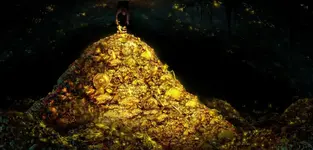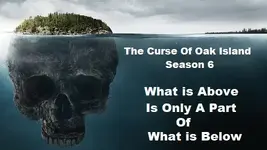You are using an out of date browser. It may not display this or other websites correctly.
You should upgrade or use an alternative browser.
You should upgrade or use an alternative browser.
Season 6
- Thread starter etex
- Start date
Clad2Silver
Bronze Member
- Joined
- Jul 17, 2018
- Messages
- 2,127
- Reaction score
- 5,914
- Golden Thread
- 0
- Location
- Eastern Connecticut
- Detector(s) used
- Garrett AT Max/ Garrett AT Pro/ Garrett Ace 400/ Garrett Pro Pointer 2 / Garrett Z-Lynk AT Propointer
- Primary Interest:
- Metal Detecting
If ANYTHING resembling "treasure" was found on Oak Island, it would be all over the news, the internet, and in the newspapers. Guess what? It isn't so there will NEVER be an episode where they find the "treasure". Did they happen to find any of that Confederate gold in the Great Lakes ? Another joke.
Robot
Bronze Member
Did they happen to find any of that Confederate gold in the Great Lakes ?
Yes they did....they moved it to Oak Island...Stay tuned!
franklin
Gold Member
- Joined
- Jun 1, 2012
- Messages
- 5,019
- Reaction score
- 7,153
- Golden Thread
- 0
- Detector(s) used
- Garrett ADS-7X, Fisher Two Box M-Scope, Mother Lode Locator, Dowsing Model 20 Electroscope, White's TM808, White's TM900, Inground Scanners
- Primary Interest:
- All Treasure Hunting
Yes they did....they moved it to Oak Island...Stay tuned!
Treasure on Oak Island must contain more gold than Fort Knox?
gazzahk
Bronze Member
- Joined
- Nov 14, 2015
- Messages
- 1,720
- Reaction score
- 2,584
- Golden Thread
- 0
- Primary Interest:
- All Treasure Hunting
So now they are going to use "sonic drilling"
https://www.monstersandcritics.com/...o-be-found-with-new-sonic-drilling-technique/
I am confident that will make all the difference....
https://www.monstersandcritics.com/...o-be-found-with-new-sonic-drilling-technique/
I am confident that will make all the difference....
etex
Bronze Member
- Joined
- Feb 20, 2013
- Messages
- 1,166
- Reaction score
- 2,066
- Golden Thread
- 0
- Location
- Longview, Texas
- Primary Interest:
- All Treasure Hunting
- #48
Thread Owner
I can probably find more treasure in the Sonic parking lot here

gazzahk
Bronze Member
- Joined
- Nov 14, 2015
- Messages
- 1,720
- Reaction score
- 2,584
- Golden Thread
- 0
- Primary Interest:
- All Treasure Hunting
The above article also has some pics of the start of a massive coffer dam they are building at Smith Cove. It makes you wonder what exactly they hope to find there... Still I suppose Smith Cove has always been the only real mystery at Oak Island....
But with the amount of times it has been dug up over the years it is hard to see what of any significance they hope to find. I suppose they may finally be able to answer what those wood structures were used for and when were they placed there....
The idea that drilling though that granite rock will help them fins something is pretty silly. If that massive rock was there then this sort of shows that other people were not digging in the same place..
I imagine I will watch the next season as I am interested in what actually happened at Smith Cove. I long ago have given up on any possibility that the Laginas will find a treasure hoard on Oak Island....
But with the amount of times it has been dug up over the years it is hard to see what of any significance they hope to find. I suppose they may finally be able to answer what those wood structures were used for and when were they placed there....
The idea that drilling though that granite rock will help them fins something is pretty silly. If that massive rock was there then this sort of shows that other people were not digging in the same place..
I imagine I will watch the next season as I am interested in what actually happened at Smith Cove. I long ago have given up on any possibility that the Laginas will find a treasure hoard on Oak Island....
Honest Samuel
Banned
- Joined
- Sep 23, 2015
- Messages
- 8,808
- Reaction score
- 4,971
- Golden Thread
- 0
- Location
- Connecticut
- Detector(s) used
- Minelab
- Primary Interest:
- All Treasure Hunting
I be watching next season because I am bore and got nothing better to do. They make money from TV money and not from any buried treasures that I am sure is there, but, cannot be recover due to water problems.
franklin
Gold Member
- Joined
- Jun 1, 2012
- Messages
- 5,019
- Reaction score
- 7,153
- Golden Thread
- 0
- Detector(s) used
- Garrett ADS-7X, Fisher Two Box M-Scope, Mother Lode Locator, Dowsing Model 20 Electroscope, White's TM808, White's TM900, Inground Scanners
- Primary Interest:
- All Treasure Hunting
Why do they keep showing Rick Lagina finding the Oak Island Treasure on "Sponsored YAHOO NEWS" Rick nor his brother have found no treasure. These lies spread by YAHOO is the same lies they spread around for the American Voters in the last Election. Why do they YAHOO NEWS KEEP SPREADING THIS CRAP WHEN THEY KNOW IT IS NOT TRUE?
Robot
Bronze Member
The Curse of Oak Island Season 6 Confirmed

[h=2]The Curse of Oak Island Season 6: What’s in store for fans?[/h]Prometheus Entertainment’s Kevin Burns also shed some light on the upcoming Season 6, and along with that, we might also get a new season of Ancient Aliens very soon. In an interview with Monster and Critics, Burns revealed a lot that fans would be getting in the upcoming season. According to him, the upcoming ‘The Curse of Oak Island Season 6,’ will dive into the history and will explore more on the ‘medieval cross,’ that they found in the previous season. He also revealed that after conducting many tests the team has managed to unveil its age, and according to them the cross is at least 600 years old.
Adding to this, he said that the cross is quite ‘extraordinary,’ and they are still conducting their test. All the pieces of evidence indicate that the cross is from the 1300 A.D. Basically according to many experts, the cross could be either from 900 A.D. or 1300 A.D., and he thinks that the Templars might have left it in that neighborhood if it had been there. So, he thinks that for some business the Templars did visit North America even before Columbus came and if it’s true, he wonders about the Templar’s belongings.
He also revealed that it was because of the Ancient Aliens show, that The Curse of Oak Island came into existence. He also describes the lead characters of ‘The Curse of Oak Island,’ show, Rick and Marty Lagina. According to him, Marty is an “open-minded skeptic,” and Rick is a “believer.”
[h=2]The Curse of Oak Island Season 6 Release Date:[/h]The Curse of Oak Island Season 6 will be released in this year’s fall.
The sixth season of The Curse of Oak Island has finally got the green light. Kevin Burns, the executive producer have revealed a new set of details. The show is quite popular, and fans are eagerly waiting for the sixth season, and finally, the wait is over, and Season 6 will be arriving very soon.
https://otakukart.com/tvshows/the-curse-of-oak-island-season-6-release-date/

[h=2]The Curse of Oak Island Season 6: What’s in store for fans?[/h]Prometheus Entertainment’s Kevin Burns also shed some light on the upcoming Season 6, and along with that, we might also get a new season of Ancient Aliens very soon. In an interview with Monster and Critics, Burns revealed a lot that fans would be getting in the upcoming season. According to him, the upcoming ‘The Curse of Oak Island Season 6,’ will dive into the history and will explore more on the ‘medieval cross,’ that they found in the previous season. He also revealed that after conducting many tests the team has managed to unveil its age, and according to them the cross is at least 600 years old.
Adding to this, he said that the cross is quite ‘extraordinary,’ and they are still conducting their test. All the pieces of evidence indicate that the cross is from the 1300 A.D. Basically according to many experts, the cross could be either from 900 A.D. or 1300 A.D., and he thinks that the Templars might have left it in that neighborhood if it had been there. So, he thinks that for some business the Templars did visit North America even before Columbus came and if it’s true, he wonders about the Templar’s belongings.
He also revealed that it was because of the Ancient Aliens show, that The Curse of Oak Island came into existence. He also describes the lead characters of ‘The Curse of Oak Island,’ show, Rick and Marty Lagina. According to him, Marty is an “open-minded skeptic,” and Rick is a “believer.”
[h=2]The Curse of Oak Island Season 6 Release Date:[/h]The Curse of Oak Island Season 6 will be released in this year’s fall.
The sixth season of The Curse of Oak Island has finally got the green light. Kevin Burns, the executive producer have revealed a new set of details. The show is quite popular, and fans are eagerly waiting for the sixth season, and finally, the wait is over, and Season 6 will be arriving very soon.
https://otakukart.com/tvshows/the-curse-of-oak-island-season-6-release-date/
franklin
Gold Member
- Joined
- Jun 1, 2012
- Messages
- 5,019
- Reaction score
- 7,153
- Golden Thread
- 0
- Detector(s) used
- Garrett ADS-7X, Fisher Two Box M-Scope, Mother Lode Locator, Dowsing Model 20 Electroscope, White's TM808, White's TM900, Inground Scanners
- Primary Interest:
- All Treasure Hunting
I have decided I will never watch anything that has the Lagina brothers in it. Be it the CSA Gold in Michigan or the Curse of Oak Island or the Aliens of Michigan. They are never going to find any treasure other than the networks money from desperate viewers like you and the rest.
Robot
Bronze Member
Hey franklin...hate to miss you on this forum!I have decided I will never watch anything that has the Lagina brothers in it. Be it the CSA Gold in Michigan or the Curse of Oak Island or the Aliens of Michigan. They are never going to find any treasure other than the networks money from desperate viewers like you and the rest.
Dave Rishar
Silver Member
Adding to this, he said that the cross is quite ‘extraordinary,’ and they are still conducting their test. All the pieces of evidence indicate that the cross is from the 1300 A.D. Basically according to many experts, the cross could be either from 900 A.D. or 1300 A.D., and he thinks that the Templars might have left it in that neighborhood if it had been there. So, he thinks that for some business the Templars did visit North America even before Columbus came and if it’s true, he wonders about the Templar’s belongings.
In the interview, he goes on to say that at least part of that evidence is that they've never seen a cross similar to that one that was more recent than 1300 AD. I'd argue that the right person on Etsy could get you a cross basically identical to that one for less than $50, meaning that (if I'm understanding him correctly) this isn't evidence at all.
However, I have a problem with the statement that I quoted - namely, the tortured logic required to arrive there. Most of us metal detectorists understand that when we find a coin from 1900, that doesn't mean that the coin had been dropped there in 1900. It may have been dropped there an hour before we found it. The context in which it was found may tell us more, but all that date does is establish the earliest possible time that it wound up there, not the most recent. (Assuming that it's not a fake, of course. Then even the date on the coin would be suspect.)
This line of though essentially reads as, and apologies in advance if I'm misunderstanding what Mr. Burns meant: "We found a cross that we think is 700 years old in Nova Scotia, and the Templars were around 700 years ago, and some people say that the Templars went to Nova Scotia, so the Templars must have placed this cross here." Which, of course, is nonsense, as I could have placed that cross there five years ago. When one stops and peels apart each individual assumption - that the cross is as old as they think that it is, that Templars went to Nova Scotia, etc - the story makes even less sense.
I've come to realize though that I'm completely missing the point here. The point is that if we define "good television" as "a product that entices many viewers to watch it," this sort of story is good television, and that's what the producers of this show are after. I suppose my real gripe is that The Curse of Oak Island, like the overwhelming majority of "reality television," is portrayed as something other than the work of fiction that it actually is, and that at least some consumers are willing to accept it as such.
Now that I think about it, this is a pretty trivial thing to be annoyed over. First world problems, right?
Also, link to the interview in its entirety here: https://www.monstersandcritics.com/...-aliens-makes-us-believe-exclusive-interview/ I didn't make it through the whole thing. It is...ah...interesting.
gazzahk
Bronze Member
- Joined
- Nov 14, 2015
- Messages
- 1,720
- Reaction score
- 2,584
- Golden Thread
- 0
- Primary Interest:
- All Treasure Hunting
This is what I would really like them to do. STOP pretending that they are still looking for treasure and get some actual historians in to explore the true history of the island. I hope they invite J.Steele to share her theory...The Curse of Oak Island Season 6,’ will dive into the history....
As far as I can see the only real mysteries left are 1. What was built at Smith Cove and why? and 2. Was the swamp man made and why?
I know they are building a massive coffer dam at Smith cove so I hope they can at least provide an answer to this question..
However if they are simply going to "taint" there investigation with the assumption that they are still looking for treasure and everything they find on OI more then 200 years old is treasure related then I think we will be in for a pretty poor season of Telly...
Last edited:
gazzahk
Bronze Member
- Joined
- Nov 14, 2015
- Messages
- 1,720
- Reaction score
- 2,584
- Golden Thread
- 0
- Primary Interest:
- All Treasure Hunting
Well said... "Even if" they could prove the age of the cross it does not show anything other then an old cross was dropped in Smiths cove sometime before Rick found it...In the interview, he goes on to say that at least part of that evidence is that they've never seen a cross similar to that one that was more recent than 1300 AD. I'd argue that the right person on Etsy could get you a cross basically identical to that one for less than $50, meaning that (if I'm understanding him correctly) this isn't evidence at all.
However, I have a problem with the statement that I quoted - namely, the tortured logic required to arrive there. Most of us metal detectorists understand that when we find a coin from 1900, that doesn't mean that the coin had been dropped there in 1900. It may have been dropped there an hour before we found it. The context in which it was found may tell us more, but all that date does is establish the earliest possible time that it wound up there, not the most recent. (Assuming that it's not a fake, of course. Then even the date on the coin would be suspect.)
This line of though essentially reads as, and apologies in advance if I'm misunderstanding what Mr. Burns meant: "We found a cross that we think is 700 years old in Nova Scotia, and the Templars were around 700 years ago, and some people say that the Templars went to Nova Scotia, so the Templars must have placed this cross here." Which, of course, is nonsense, as I could have placed that cross there five years ago. When one stops and peels apart each individual assumption - that the cross is as old as they think that it is, that Templars went to Nova Scotia, etc - the story makes even less sense...

Last edited:
franklin
Gold Member
- Joined
- Jun 1, 2012
- Messages
- 5,019
- Reaction score
- 7,153
- Golden Thread
- 0
- Detector(s) used
- Garrett ADS-7X, Fisher Two Box M-Scope, Mother Lode Locator, Dowsing Model 20 Electroscope, White's TM808, White's TM900, Inground Scanners
- Primary Interest:
- All Treasure Hunting
Hey franklin...hate to miss you on this forum!
You won't miss me because the finds will be the same and the post will be the same, all nothing about nothing.
gr88bd
Full Member
- Joined
- Dec 11, 2017
- Messages
- 110
- Reaction score
- 157
- Golden Thread
- 0
- Location
- Grove City, Ohio
- Detector(s) used
- Garrett 250, Divining Rods, brass pendulum
- Primary Interest:
- All Treasure Hunting
This is what I would really like them to do. STOP pretending that they are still looking for treasure and get some actual historians in to explore the true history of the island. I hope they invite J.Steele to share her theory...
As far as I can see the only real mysteries left are 1. What was built at Smith Cove and why? and 2. Was the swamp man made and why?
I know they are building a massive coffer dam at Smith cove so I hope they can at least provide an answer to this question..
However if they are simply going to "taint" there investigation with the assumption that they are still looking for treasure and everything they find on OI more then 200 years old is treasure related then I think we will be in for a pretty poor season of Telly...
Im a friend of hers, I think she's really onto something with her theory although a lot of evidence has either rotted away or been destroyed to almost beyond recognition by treasure searchers. .. She has a book out and has volumes of research AND she's a real nice person.
Similar threads
- Replies
- 230
- Views
- 7K
Users who are viewing this thread
Total: 1 (members: 0, guests: 1)
Latest Discussions
-
Naturallly Occuring Formation OR Manmade Treasure Marker/Sign?
- Latest: Crosse De Sign
-
Confederate Gold from the Civil War was Found in a Shocking Place
- Latest: diamonddave
-
-
-
-




